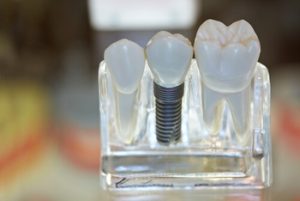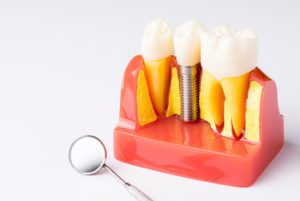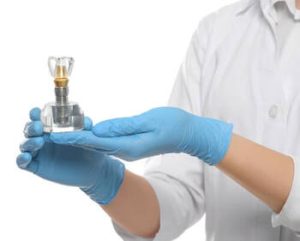If you’re exploring options for replacing missing teeth, you’ve probably encountered dental implant services. These modern marvels are often hailed as the leading option for tooth replacement, offering a permanent solution that feels and works just like natural teeth. In pursuing an affordable dental implant, Kuala Lumpur is a favourable spot for dental treatments due to the lower dental implant cost. While dental implants are available in many countries, there’s a growing trend of people choosing to get their dental implant treatment in Australia. But why is this the case? Let’s dive into the details of the dental implant procedure and understand the benefits of choosing Australian dental clinics for your smile makeover.
What Are Dental Implants and Why Are They So Popular?
 A dental implant is an artificial tooth root made of titanium, a material known for its strength and compatibility with human bone. These synthetic tooth roots are surgically placed into the jawbone during dental implant surgery, where they fuse with the bone in a process called osseointegration, acting as a replacement root for a missing tooth.
A dental implant is an artificial tooth root made of titanium, a material known for its strength and compatibility with human bone. These synthetic tooth roots are surgically placed into the jawbone during dental implant surgery, where they fuse with the bone in a process called osseointegration, acting as a replacement root for a missing tooth.
The appeal of dental implants lies in their power to mimic the function and appearance of natural teeth. Unlike some other tooth replacements, dental implants remain securely in place, allowing you to speak, laugh, and eat without any slipping or clicking. They are also easier to clean and maintain, promoting better oral hygiene and health. Dental implants are often the go-to option for those aiming to replace their missing teeth with a solution that feels just like their own.
The Dental Implant Procedure: A Step-by-Step Guide
Getting dental implants includes multiple steps, beginning with a consultation with your dentist. At this appointment, the dentist will evaluate your oral health, checking the state of your jawbone and nearby teeth to see if dental implants are right for you.
Initial Consultation and Planning
This stage involves a thorough examination of your mouth using advanced dental imaging techniques, such as X-rays or CT scans. These images help the dentist evaluate bone density and identify any issues that might affect the implant placement, such as significant bone loss or proximity to important structures like nerves or sinuses.
Tooth Extraction (If Necessary)
If you have a damaged or decayed tooth that needs to be replaced, it will be extracted before the implant procedure. In some cases, bone grafting may be required to ensure enough bone to support the implant. Bone grafting procedures involve adding bone material to the jaw to strengthen it, a common step for bone loss due to missing teeth.
Implant Placement
Once your jawbone is ready, the dentist will surgically fix the dental implant into the bone. This is typically done under local anaesthesia, although sedation dentistry is available for patients who are anxious or undergoing multiple implants. The implant is left to heal and merge with the bone, which can take several months.
Abutment Placement
After the implant has blended with the bone, an abutment is positioned on top of the implant. This small connector piece will hold the new artificial tooth in place. The gums are then given time to heal around the abutment.
Placement of the Replacement Tooth
Finally, a custom-made crown, designed to match the colour and shape of your existing teeth, is attached to the abutment. This new artificial tooth completes the dental implant procedure, restoring your smile and function.
Why Consider Dental Implants in Australia Over Kuala Lumpur?
While Kuala Lumpur is a popular destination for medical tourism, especially for procedures like dental implants in Kuala, there are several compelling reasons why Australian dental clinics might be a better choice for your dental implant treatment.
High Standards of Care and Regulation
Australian dental professionals adhere to strict standards of care regulated by the Australian Dental Council and the Dental Board of Australia. These regulatory bodies ensure that all dental practices meet rigorous safety and quality standards, which is not always guaranteed in other countries, including Malaysia. The Malaysian Dental Association and Malaysian Dental Council regulate dental services, but the level of oversight and enforcement can vary significantly.
Cutting-Edge Technology and Techniques
Australian dental clinics are known for their investment in state-of-the-art technology and the latest techniques in implant dentistry. From advanced imaging techniques that provide precise implant placement to digital planning tools that enhance the accuracy of dental implant surgery and other dental surgery procedures, Australian clinics often lead the way in innovation. This technology improves the outcome of the implant procedure and enhances the overall patient experience.
Comprehensive Patient Care and Education
In Australia, patient education is a cornerstone of dental care. Australian dental professionals take the time to make sure that patients are well-informed about their dental implant treatments, including the risks and benefits of the surgical procedures involved. This comprehensive approach helps patients make well-informed decisions and feel confident about their treatment plans.
Highly Trained and Experienced Dental Professionals
Australian dental professionals offer access to some of the world’s most qualified and experienced dental practitioners. Many Australian dentists undergo extensive training in implant dentistry, including specific surgical procedures like bone grafting and wisdom tooth extraction. This expertise guarantees that patients receive a premium level of care, reducing the risk of complications and enhancing the long-term success of their implants.
Post-operative care and Follow-Up
One significant advantage of getting dental implants in Australia is the focus on aftercare and follow-up. Dental implant surgery is just the beginning of a journey towards a healthier smile, and Australian clinics emphasise the importance of post-operative care to ensure optimal healing and success. This includes regular check-ups, oral hygiene advice, and ongoing support, something that may not be as readily available if you choose to get implants in Kuala Lumpur.
Hidden Costs of Dental Tourism
Dental tourism can seem like a cost-effective solution for expensive dental procedures, but it’s important to consider all potential expenses before deciding. While the initial price may be lower, hidden costs can significantly affect your overall budget.
Travel and Accommodation
Flights, hotels, and transportation expenses can increase, especially if multiple visits are needed over several months.
Follow-up Care
Complications may require additional treatments, either through costly return trips or expensive corrective procedures at home.
Miscommunication and Different Medical Standards
Language barriers and varying standards in dental services can lead to misunderstandings and unexpected outcomes, resulting in further expenses.
Loss of Earnings
Taking time off work for travel and recovery can lead to lost income, adding to the overall cost of dental tourism.
Factors Affecting the Cost of Dental Implants
Complexity of the Procedure: Additional dental treatments like bone grafting or sinus lifts due to insufficient bone density can increase costs. The cost of dental implants can vary according to the complexity of the procedure and the materials used.
Quality of Materials: Higher-quality materials, such as premium titanium or zirconia, are more expensive.
Experience and Expertise of Professionals: More experienced implant dentists and dental professionals typically charge higher fees, reflecting their extensive training.
Geographical Location: Clinics in metropolitan areas or regions with a higher cost of living usually have higher prices.
Type of Implant and Prosthetic Teeth: Costs vary depending on whether single implants, multiple implants, or full-arch restorations are needed.
The Cost Factor: Is It Cheaper in Kuala Lumpur?
One of the main reasons people consider getting dental implants in Kuala Lumpur is the perceived cost savings. On the surface, dental implant costs in Malaysia might seem lower than in Australia. However, it’s important to look beyond the initial price tag.
In Kuala Lumpur, the lower cost often reflects the level of training, quality of materials, and scope of post-operative care. While you might save on the upfront costs, complications or additional treatments can quickly add up. Moreover, the cost of travelling back for follow-up appointments, or in the event of any issues, can make overseas dental treatments more expensive in the long run.
Although dental implant costs in Australia may be higher, they typically include a comprehensive package of services that covers everything from the primary consultation to the final placement of the artificial replacement teeth. This all-inclusive approach can offer better value for money, especially considering the long-term benefits and peace of mind of choosing a reputable Australian dental practice.
Comparing Dental Implant Costs: Australia vs. Kuala Lumpur
 When comparing dental implant costs between Australia and Kuala Lumpur, it’s essential to consider the starting prices in each country and what those costs typically include. In Kuala Lumpur, the starting price for a single dental implant is approximately 1,500 AUD. This price often covers the basic implant placement but may exclude additional procedures such as tooth extraction, bone grafting, or the placement of the final crown. In contrast, the starting price for a dental implant in Australia is around 3,000 AUD. While this price is higher, it generally includes a more comprehensive package, covering everything from the initial consultation and imaging to the final placement of the artificial tooth. This all-inclusive approach in Australia provides transparency in costs and peace of mind, knowing that experienced professionals manage every step of the dental implant process with the latest technology.
When comparing dental implant costs between Australia and Kuala Lumpur, it’s essential to consider the starting prices in each country and what those costs typically include. In Kuala Lumpur, the starting price for a single dental implant is approximately 1,500 AUD. This price often covers the basic implant placement but may exclude additional procedures such as tooth extraction, bone grafting, or the placement of the final crown. In contrast, the starting price for a dental implant in Australia is around 3,000 AUD. While this price is higher, it generally includes a more comprehensive package, covering everything from the initial consultation and imaging to the final placement of the artificial tooth. This all-inclusive approach in Australia provides transparency in costs and peace of mind, knowing that experienced professionals manage every step of the dental implant process with the latest technology.
Understanding the Risks: Dental Implant Surgery Carries Risks
Remembering that any surgical or invasive procedure carries risks is also crucial. Dental implant surgery involves placing a foreign object into the body, which always comes with the possibility for complications, such as infection, nerve damage, or implant failure. Choosing a qualified and experienced dentist, like those found in Australian dental clinics, can significantly minimise these risks and help maintain optimal oral health.
Frequently Asked Questions (FAQs)
Dental implants are ideal for replacing missing teeth due to their durability and natural appearance. However, it’s essential to understand all aspects of the procedure before making a decision. Here are some frequently asked questions to help you learn more about dental implants and what to expect.
What are the main perks of choosing dental implants over other tooth replacement options?
Dental implants offer a valid solution that resembles the look, feel, and function of natural teeth. Unlike dentures or bridges, implants are stable and durable, do not require adhesives, and help maintain jawbone health by preventing bone loss.
How much time does the entire dental implant procedure require?
The entire dental implant process, from the consultation to the final placement of the replacement tooth, can take several months. This timeframe includes healing periods after each procedure, such as implant placement and abutment installation, to ensure proper integration with the jawbone.
Are there any specific care instructions for dental implants?
Taking care of dental implants follows the same routine as caring for natural teeth. It involves regular brushing, flossing, and dental check-ups to ensure the implant remains healthy and free of plaque. It’s also important to avoid habits that could damage the implant, such as chewing on hard objects.
What should I consider when choosing a dental clinic for implants?
When selecting a dental clinic for implants, consider the qualifications and experience of the dental professionals, the technology and materials used, the range of services provided, and the quality of patient care. It’s also helpful to read reviews and seek recommendations from others.
Is everyone eligible for dental implants, or are there certain criteria that must be met?
Dental implants are an option for many, but specific requirements must be fulfilled. Typically, candidates need to have healthy gums, sufficient jawbone density, and no untreated gum conditions. A dental professional will assess your suitability for implants during a consultation.
Are dental implants covered by health insurance?
Insurance coverage for dental implants varies by plan. Some insurance policies may cover some of the costs, particularly if the treatment is deemed medically necessary. It’s essential to contact your insurance company to clarify what your policy includes.
Why might dental implants in Australia be a better choice than in Kuala Lumpur?
Choosing dental implants in Australia might be preferable due to the high standards of care, comprehensive patient support, cutting-edge technology, and experienced dental professionals. These factors contribute to a more successful and satisfying outcome compared to the options available in Kuala Lumpur.
What are the possible risks associated with dental implants?
Like any surgical procedure, dental implants carry some risks, including infection, implant failure, nerve damage, and complications with surrounding teeth or gums. However, these risks are minimised when performed by experienced professionals in a regulated environment.
Final Thoughts: Making the Right Choice for Your Smile
When it comes to getting an affordable dental implant, Kuala Lumpur stands out as a favoured option for many. However, the decision of where to get your dental treatment should be based on more than just cost. Factors like the quality of care, the experience of the dental professionals, and the level of patient support can all impact the success of your dental implant treatment and your overall satisfaction.
 While getting implants in Kuala Lumpur might be tempting due to the lower cost, the advantages of choosing Australian dental clinics are clear. From superior technology and highly trained professionals to comprehensive aftercare and a focus on patient education, Australia offers a level of service and care that can make all the difference in achieving the smile of your dreams.
While getting implants in Kuala Lumpur might be tempting due to the lower cost, the advantages of choosing Australian dental clinics are clear. From superior technology and highly trained professionals to comprehensive aftercare and a focus on patient education, Australia offers a level of service and care that can make all the difference in achieving the smile of your dreams.
So, before you book that flight to Kuala Lumpur, consider the long-term benefits of investing in your smile closer to home. After all, your teeth are for life, and they deserve the best care possible.
For more information about dental implants or to book a consultation, please call Beyond Infinity Dental at (02) 8806 3799.
Note: Any surgical or invasive procedure carries risks. Before proceeding, you should seek a second opinion from an appropriately qualified health practitioner.
References:
Kaiser Family Foundation. (n.d.). Language barriers in health care: Findings from the KFF survey on racism, discrimination, and health. Retrieved from https://www.kff.org/racial-equity-and-health-policy/poll-finding/language-barriers-in-health-care-findings-from-the-kff-survey-on-racism-discrimination-and-health/
American Academy of Periodontology. (n.d.). Dental implant procedures. Retrieved from https://www.perio.org/for-patients/periodontal-treatments-and-procedures/dental-implant-procedures/
minfo. (n.d.). The true cost of dental tourism: Hidden expenses and long-term consequences. Medium. https://medium.com/@minfo/the-true-cost-of-dental-tourism-hidden-expenses-and-long-term-consequences-d8cd38c8dd52
Popescu, D., Stoia, D. I., Ciuca, C., Croitoru, C., & Lupu, D. (2019). Thermal and mechanical analysis of composite materials used for dental fillings. Materials Science and Engineering: C, 96, 169-177. https://doi.org/10.1016/j.msec.2018.11.004
WebMD Editorial Contributors. (n.d.). What to know about dental implant complications and risks. WebMD. https://www.webmd.com/oral-health/what-to-know-about-dental-implant-complications-risks
Howe, M. S., Keys, W., & Richards, D. (2019). Long-term (10-year) dental implant survival: A systematic review and sensitivity meta-analysis. Journal of Dentistry, 84, 9-21. https://doi.org/10.1016/j.jdent.2019.03.004









